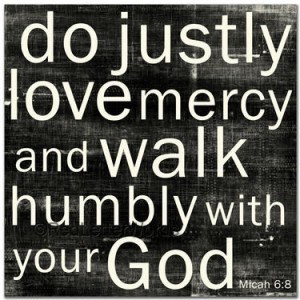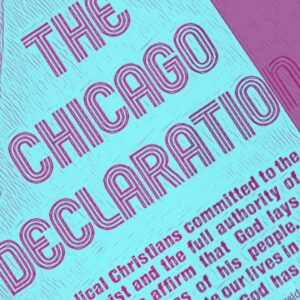 Holistic Christian discipleship requires a balanced relationship with God, God’s people, and God’s world. The Israelite prophet Micah recorded God’s intention for us (6:8): “Love mercy, do justice, and walk humbly with your God.” Amos, a contemporary of Micah, exhorted God’s people to “let justice run down like water, and righteousness like a mighty stream” (5:24).
Holistic Christian discipleship requires a balanced relationship with God, God’s people, and God’s world. The Israelite prophet Micah recorded God’s intention for us (6:8): “Love mercy, do justice, and walk humbly with your God.” Amos, a contemporary of Micah, exhorted God’s people to “let justice run down like water, and righteousness like a mighty stream” (5:24).
God’s Word is clear that justice should not be relegated to a file marked “For Social Activists Only,” but the concept of biblical justice was absent from the formative stages of my faith journey. I grew up in a fundamentalist ghetto that kept the world out and kept us out of the world, and I recall no sermons, Bible studies, or prayer requests dealing with our current biblical understanding of justice.
I began to experience and appreciate the negative side of justice when Uncle Sam airlifted me out of the ghetto to the wasteland of Vietnam and showed me in that violent cesspool the injustice of war. Other almost exclusively secular frameworks introduced me to the injustice of racial prejudice, life in urban ghettos, and poverty.
In the years that followed, other influences played a part in my understanding of injustice. I read Senator Mark Hatfield’s Conflict and Conscience and Between a Rock and a Hard Place; heard Tom Skinner preach on peace and Vernon Grounds teach on the challenges of liberation theology; heard John Perkins speak on the three R’s (reconciliation, relocation, and redistribution); and ingested books by Jim Wallis, Ron Sider, and Don Dayton.
Throughout my introduction to justice, two factors played a key role in my discoveries. One was my relationship with my future wife, Holly. I was into having a good time; she was serious, concerned, and trying to make a difference in the lives of kids living in the ghetto. The other was my fundamentalist upbringing. While there were a number of negatives, a positive was our emphasis on the authority, relevance, and importance of Scripture. Like many fundamentalists, my nose was buried in my Bible, and God’s Word says plenty about justice. Eventually the concept caught my attention, and I soon moved from a secular to a spiritual understanding.
What does God’s Word say about justice? Micah’s thoughts in 6:8 serve as an outline for other 8th-century B.C. prophets: Amos declared that God’s people are to do justice (5:6); Hosea pleaded for God’s people to love justice (6:6); and, Isaiah encouraged God’s people to walk in the way of justice (30:15).
The setting for Micah’s “word from the Lord” is a covenant lawsuit. Israel had not lived up to its end of the covenant, perpetuating injustice rather than doing justice, so Yahweh summons them to hear God’s charges against the nation. In an interesting irony, the prosecuting deity asks if Israel has any charges against him: “Have I done something to you? Have I created a hardship for you? Answer me!” Before Israel can get in a word of rebuttal, God responds in rapid-fire fashion: “I bailed you out of Egypt where you were unjustly enslaved. I sent leaders to lead you out of bondage: Moses, Aaron and Miriam…. Don’t you remember?!”
Micah, like a public defender called upon to advocate for a guilty client, presents Israel’s weak defense in a step-by-step escalation of rhetorical questions. The first question on behalf of his client is, “With what shall I come before the Lord?” He asks what those sacrifices might be: Burnt offerings? A year-old lamb? One thousand rams? Ten thousand rivers of oil? The first born? God’s answer to the defense attorney’s interrogation? “No!” God does not want things: he wants us.
And what does God require of Israel/me/you? According to Micah, who shifts roles from public defender to advocate for the plaintiff, “The Big Three”:
1) Doing. Israel failed “to do justice.” The powerful oppressed the powerless (2:1-2, 8-9; 3:1-3, 9-10). Laborers were exploited (3:10). Courts were corrupt (3:11).
2) Loving. Israel failed “to love kindness/devotion/mercy.” In the Hebrew it’s hesed, God’s covenant love–love with a strong element of loyalty.
3) Walking. Israel failed “to walk humbly with your God.” Biblically, it means to walk circumspectly, prudently, carefully. It was the Hebrew word for ethics, halacha, as in to walk in one’s day-by-day life (cf. Psalm 1). In the Gospels, Jesus’ most characteristic invitation was not “believe” but “follow me”–walking.
“When we walk with the Lord, in the light of His word,” as the gospel song goes, we are compelled to include justice and love. God’s Big Three, as presented by Micah, finds its counterpart in Jesus’ Big Three (again in the form of a prosecutor’s accusation, in Matthew 23:23): “You have neglected the more important matters of the law–justice, mercy, and faithfulness.”
May we not be found negligent, but “let justice roll down” in all of life: my life, your life, the life of the church, and in our world.


